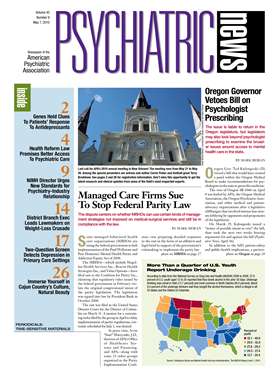As director of the National Institute of Mental Health, Thomas Insel, M.D., commands some attention.
So a commentary by Insel in the
Journal of the American Medical Association on what has become one of the most contentious issues in psychiatry today—psychiatrists' relationships with the pharmaceutical industry—was bound to attract attention (see
NIMH Head Wants Psychiatrists to Rethink Industry Ties).
In that article he cited a “culture of influence” among academic researchers, practitioners, and the pharmaceutical industry and reviewed data about conflict of interest and its effect on research and clinical practice. And he suggested that academic leaders, specialty societies, and patient-advocacy organizations could “turn the tables of public trust by developing a culture of transparency for psychiatry's collaborations with industry, including the clear separation of academic-clinical missions from industry marketing.”
APA leaders who spoke with Psychiatric News said Insel's commentary, though tough on psychiatry, was largely accurate and will likely have an impact.
“I think it was a very fair analysis of the situation,” said APA past President Paul Appelbaum, M.D. “I read him as saying that although it's hard to know whether psychiatry has more problems than other specialties with its relationships with industry, it certainly has problems. And that it is incumbent upon the specialty to get out in front of those problems. I think he is right on target.”
Appelbaum chaired a work group that last year formulated stringent recommendations regarding psychiatrists' interactions with industry. They include, among others, recommendations that psychiatrists avoid participating in or attending company-supported promotional talks unless those talks are sponsored by organizations and institutions accredited by the Accreditation Council on Continuing Medical Education, avoid accepting gifts of any kind from industry, and avoid participation in consulting arrangements “in which they are unlikely to make substantive contributions.”
After a contentious debate last year, the APA Assembly did not approve the recommendations. However, they were endorsed by the Assembly Executive Committee in January and will return to the Assembly for a vote this month at its meeting in New Orleans.
“The ball is in the Assembly's court,” Appelbaum said. “I am hopeful that perhaps Insel's commentary will help to stimulate the field to adopt a set of recommendations. The direction in general is toward greater recognition that relationships are problematic and the need for guidelines to limit adverse consequences.”
Robert Freedman, M.D., editor in chief of the American Journal of Psychiatry, agreed that Insel's perspective is accurate, but indicated that the pharmaceutical industry bears some of the blame for a relationship that has gone awry. “I think [Insel's] conclusion is exactly the one I would make,” Freedman said. “We have important things to do with the drug industry for our patients in terms of developing new treatments. But I would say there is a responsibility on the part of industry with regard to overly aggressive sales techniques that end up denigrating the psychiatric profession. Psychiatrists' acceptance of a role in those techniques makes our whole profession look bad.”
Wade Myers, M.D., chair of APA's Ethics Committee, said psychiatrists' involvement with the pharmaceutical industry had “dashed forward faster than a sound ethical foundation could be established underfoot.”
He added, “Some psychiatrists who entered this arena unwittingly strayed beyond the limits of professional morals, others reportedly did so with less naivete. The challenge we now face is to create a transparent, ethically sustainable field of collaboration, cleared of the mines of bias and financial conflicts of interest, that is respectful of our professional values.”
Daniel Carlat, M.D., an Assembly representative from Massachusetts who has been vocal about conflict-of-interest issues, called Insel's commentary “courageous” and said he hoped it would have an impact on the Assembly's deliberations this month.
“I would be very surprised if it didn't have a concrete effect on decision making within APA,” Carlat said. “I think the Assembly meeting in New Orleans could be a turning point.”

